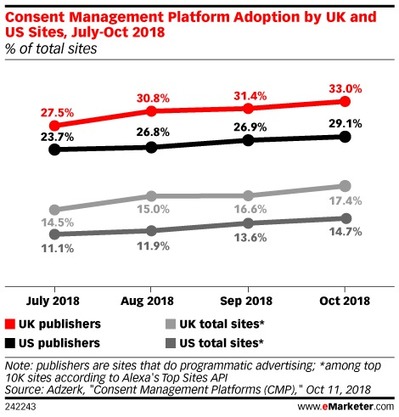While the EU’s General Data Protection Regulation (GDPR) has led several marketing tech firms to pivot their business models and pull out of Europe, it has been helpful for others in the crowded industry landscape.
The GDPR, which became enforceable on May 25 this year, states that a company cannot use someone’s personal data unless they give explicit permission. Companies that violate the GDPR face a fine of €20 million ($22.1 million) or 4% of global revenues, whichever is greater. As the need to gather user consent became imperative for marketers, the synonymous buzzwords “consent management platform” and “consent management provider” gained popularity. Because this is ad tech where everything must be labeled as an acronym, these products are referred to as CMPs.
CMPs collect and store customers’ consent data. This helps marketers keep track of when users do and do not give consent to have their data tracked. CMP providers are hoping that new data privacy regulations like the GDPR and the California Consumer Privacy Act will bolster demand for their products.
Adzerk monitored how the 10,000 most popular websites (according to Alexa rankings) in the US and UK have used CMPs. It found that the number of top websites using CMPs in both the UK and US has increased by about 3 percentage points since July, which is the first month that Adzerk began tracking CMP usage. When looking specifically at web publishers that sell programmatic ads, one-third of UK publishers and about three in ten US publishers use CMPs.
Sourced through Scoop.it from: www.emarketer.com



Leave A Comment